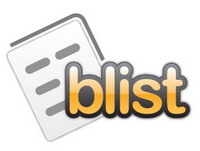Monday, January 28, 2008
Interview with Kevin Merritt, Founder of Blist

Seattle-based Blist (www.blist.com), is unveiling the firm's products and services today at the DEMO conference. Blist is developing a web-based, user-friendly database targeted at mainstream, non-technical users. We thought it would be interesting to hear about the company and what it is hoping to do. We spoke with Kevin Merritt, the founder and CEO of the firm, last week ahead of its launch.
What does your company do?
Kevin Merritt: We're creating the world's easiest database. We're a little different from other databases, which typically target DBAs and programmers. We're explicitly targeting a mainstream audience.
Tell us a bit more--what does that mean?
Kevin Merritt: The average person today uses Excel as a quasi-database, and those people are much closer to our target audience than those who are using Access, SQL Server, or MySQL. We recognized that people who use Excel as a database find that it doesn't quite work right to try to use it as a real database. To solve those problems, we've created a database for mainstream users.
What does it look like to end user--is this software you install, or is it available over the Internet?
Kevin Merritt: It's a web-based application, which you can get to by logging into our web site. We create lists -- we call our databases lists -- where they can create using a pretty innovative user interface we developed in Flash.
You mention users you are targeting usually use Excel. What's benefit of your product over using Excel?
Kevin Merritt: There's a couple of things. By delivering the service on the web, you address all of the collaboration issues that Excel has. Typically, when someone creates a database like Excel, they mail it around. Reconciling changes can be difficult. On top of that, there are all sorts of unusual fits when you try to use Excel as a database. Excel was designed for crunching numbers, and does a reasonable job with text, numbers, and dates, but can't handle more interesting data like photographs, documents, email addresses, and web sites. It's cumbersome to manage things like that in Excel. We've solved some of those problems and allow users to have richer data types than text, numbers, and dates. On top of that, because it's on the web, we can focus on collaboration, sharing, publishing, and distributing that data.
What's your background, and why did you start the firm?
Kevin Merritt: I'm a technologist by background. This is my second company -- I started an email archiving service called MessageRite in 2002. It ended up acquired by Microsoft in 2005. One of the observations I made was a long time ago, which was that most other industries have gone through this democratization, where mainstream users successfully accomplish tasks on their own where it used to require a centralized specialist. Through technical advances, they allow people to work through on their own without the need for that centralized specialist. Think about tools like PowerPoint and Visio today -- you can use them to create your own presentations, schematics, and drawings. Not long ago, that was centralized. We've extended that to working with data, and at some point believe working data will be democratized as well. What holds it back is that not enough has been invested on innovative user interfaces or metaphors for modeling data.
How's the company funded?
Kevin Merritt: We started in early 2007. Selling my last company to Microsoft helped to catalyze this one. We're self funded to date, and will probably raise a round in 2008.
Will this service be available for free or will people have to pay for it?
Kevin Merritt: There will be two versions -- a free consumer version, and a premium version aimed at small and midsized businesses. It will be through a monthly subscription.
Are there any typical applications you think this might be best used for?
Kevin Merritt: On the consumer side, you might use it for your home owner's association directory, to manage your soccer league, for your recipe collection, or your project list. The basic idea is once you've acclimated to using it in the consumer space, you're more inclined to take it to work. There, you could use it for organizing your sales leads, or other categories at work.
Thanks!